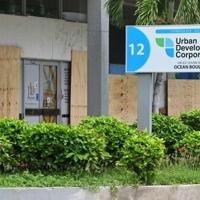Hurricane Melissa threatened Jamaica Monday with potentially deadly rains after rapidly intensifying into a top-level Category 5 storm, as residents scrambled for shelter from what could be the island’s most violent weather on record.
Melissa has already been blamed for at least four deaths in Haiti and the Dominican Republic, and was set to unleash torrential rains on parts of Jamaica in a direct hit on the Caribbean island.
Part of the punch stems from Melissa’s worryingly slow pace: it’s lumbering along slower than most people walk, at just three miles per hour or less.
So areas in its path could endure punishing conditions for far longer than a hurricane that passes by more quickly.
Melissa is packing maximum winds nearing 165 miles (270 kilometers) per hour, the US National Hurricane Center (NHC) said in its latest update.
Up to 40 inches (about a meter) of rainfall were forecast, with deluges expected to bring flash flooding and landslides to Jamaica, Haiti and the Dominican Republic.
“This extreme rainfall potential, owing to the slow motion, is going to create a catastrophic event here for Jamaica,” NHC Deputy Director Jamie Rhome said.
Storm surge was likely along Jamaica’s southern coast, with waters potentially rising some 13 feet with a likelihood of “large and destructive waves.”
Experts warned it could be the strongest storm to make landfall in Jamaica’s recorded history.
NHC Director Michael Brennan said Jamaicans should prepare to shelter in place well through Tuesday.
Some residents were scrambling to makeshift shelters for lack of other safe spaces to go.
In the farming community of Flagaman in St. Elizabeth, some residents hunkered down in a bar.
Owner Enrico Coke said he opened his place for fear that his neighbors had nowhere to go: “I’m concerned about farmers, the fishermen will be suffering after this.”
“We’ll need help as soon as possible, especially water for the people.”
A 79-year-old man was found dead in the Dominican Republic after being swept away in a stream, officials there said Saturday. A 13-year-old boy was missing.
In neighboring Haiti, the civil protection agency reported the deaths of three people caused by storm conditions.
“You feel powerless, unable to do anything, just run away and leave everything behind,” Angelita Francisco, a 66-year-old homemaker who fled her neighborhood in the Dominican Republic, told AFP through tears.
Floodwater had inundated her house, causing her refrigerator to float away as trash bobbed around the home.
– ‘Cannot bet against Melissa’ –
Jamaica was expected to see deteriorating conditions from Melissa through Monday, with landfall expected early Tuesday.
The NHC warned of “catastrophic” flash flooding, landslides and destructive winds that could cause lengthy power and communications outages along with “extensive infrastructural damage.”
Winston Moxam was hurrying to prepare his home for the coming storm, telling AFP if “I lose my roof, I lose a whole lot of things.”
He said he was particularly worried by warnings it could be worse than 1988’s Hurricane Gilbert, which left over 40 dead in Jamaica and killed hundreds more across the Caribbean and in Mexico.
Meteorologist Kerry Emanuel emphasized that a warming climate was causing more storms to rapidly intensify as Melissa did, and especially raises the potential for enormous rains.
“Flooding is one of the major sources of damage and loss of life,” he told AFP. “Water kills a lot more people than wind.”
The international airport in Kingston closed late Saturday, as did all seaports.
Government official Desmond McKenzie said storm shelters had been activated across the island nation as he begged residents to seek shelter.
“This is one bet you cannot win. You cannot bet against Melissa,” he warned.
After pummeling Jamaica, the storm was forecast to head north and cross over eastern Cuba on Tuesday night, while continuing to bring rain and heavy winds to Haiti and the Dominican Republic.
Melissa is the 13th named storm of the Atlantic hurricane season that will run into late November.
The last major hurricane to impact Jamaica was Beryl in early July 2024 — an abnormally strong storm for the time of year.
bur-mdo/dw


